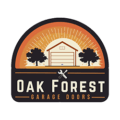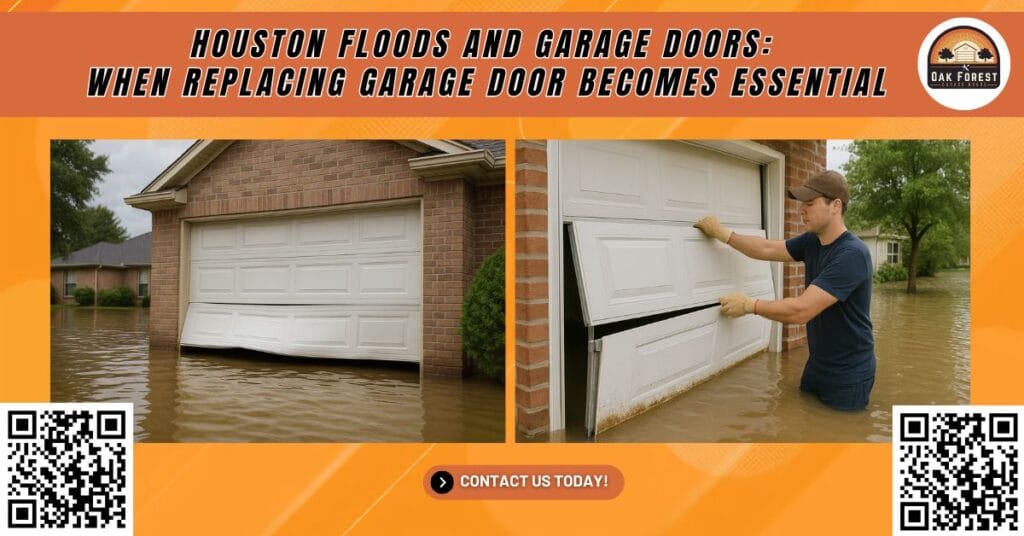When Hurricane Harvey swept through Houston, over 150,000 homes were impacted by devastating floodwaters. We recently helped a family living near W 43rd Street who faced a common yet overwhelming situation: their garage door had buckled under the pressure of rising water. The garage door opener failed due to a short circuit, the garage door panels were warped and rusted, and the insulation inside the panels had completely broken down. It wasn’t just about access, it was about safety, energy efficiency, and protecting the integrity of their home. In their case, replacing garage door was the only safe and practical solution to restore function and prevent future issues.
At Oak Forest Garage Doors, we’ve serviced countless homes affected by flood damage in Houston. Our trained technicians have seen firsthand how powerful storms wreak havoc on garage door systems, from torsion springs to lift mechanisms, opener motors, and the bottom panel that often takes the worst hit. In many situations, garage door replacement becomes not only a smarter financial decision but also a necessary step for long-term safety and functionality.
If you live in flood-prone areas like Houston, understanding the risks and knowing when replacing your garage door is necessary can save you from costly repairs, improve your home’s energy efficiency, and prevent future emergencies. In this article, we’ll provide a comprehensive guide to help you navigate the impact of floods on garage doors, what to look for, and why acting quickly is key.
How Floods Damage Garage Doors: A Breakdown of Critical Issues
Flooding can compromise nearly every component of a garage door system—some damage is visible, while other effects remain hidden until a sudden breakdown occurs. Understanding the step-by-step breakdown of how floodwater affects your garage door can help you assess the urgency of a replacement process.
1. Rust, Corrosion, and Component Deterioration
Steel garage doors, which are popular for their durability, are highly vulnerable to corrosion when submerged in floodwater. Moisture trapped within door panels, hinges, garage door springs, and track systems creates the perfect environment for rust. Once the torsion springs or extension springs begin to rust, the door can suddenly lose tension or collapse during operation, posing a significant safety risk.
Corroded brackets, rollers, and hinges contribute to uneven movement and noisy operation. If your garage door is making grinding noises or jerking during opening, it’s likely due to flood-related corrosion inside the moving parts.
2. Water-Damaged Garage Door Openers and Electronics
A garage door opener, whether it’s a LiftMaster, Chamberlain, or another model, houses sensitive electronics that are easily damaged by water. The logic board, motor, and battery backup system can fail instantly if submerged, even briefly. Water exposure to these parts may also pose an electrical fire risk.
Flood damage often leads to power outages, and unless your opener has a smart feature or backup battery, you’ll lose access to your garage. Many newer models offer smartphone integration, Wi-Fi connectivity, and are compatible with systems like Amazon Alexa for convenience, but even these advanced features are rendered useless by flood damage.
3. Warped Panels and Damaged Insulation
If your garage door features foam insulation, particularly polyurethane or polystyrene, it’s likely to absorb moisture quickly. This leads to:
- Swelling and panel distortion
- Loss of R-value, which is a measure of insulation value
- Growth of mold and mildew, creating health hazards
Damaged garage door panels may no longer align correctly with the tracks, making the garage door installation misaligned and prone to jamming. Your garage could lose its energy efficiency, making it hotter in summer and colder in winter, driving up energy bills and reducing return on investment.
Key Signs That Replacing Your Garage Door Is Essential
Many homeowners attempt temporary garage door repairs after flooding, but without addressing the underlying issues, you’re simply delaying the inevitable. Below are unmistakable signs that you need to consider a new garage door:
- Waterlogged insulation or a bad odor from within the panels
- Misaligned or sagging door that affects smooth operation
- Openers that fail or operate intermittently
- Rust on door springs, hinges, or tracks
- Visible warping or bubbling of paint and materials
- Soaked bottom panels the first panel typically absorbs the most water
- Excessive energy bills due to poor insulation
Ignoring these problems can result in costly repairs, safety hazards, and complete system failure during emergencies.
Why Replacement Is Better Than Repair: A Long-Term Perspective
In many post-flood situations, repairing your old door is like putting a Band-Aid on a major injury. Here’s why replacing the garage door is often the best move:
1. Safety Comes First
A door with corroded torsion springs, weak panels, or faulty sensors is not just a nuisance it’s a safety hazard. A garage door is the heaviest moving object in your home. Replacing it ensures the safety of your family, children, and pets.
2. Improved Energy Efficiency
New garage doors come with advanced insulation systems that maintain stable temperatures inside your garage. This is especially beneficial in Houston, where the heat can be brutal. Modern garage doors offer superior R-values, preventing thermal transfer and lowering your energy costs.
3. Smart Features and Modern Convenience
Today’s garage doors come with smart openers, Wi-Fi capabilities, phone control, and security camera integration. Whether you use your garage for storage, hobbies, or a home gym, a smart garage door makes access easy and secure.
4. Enhanced Curb Appeal and Home Value
Your garage door takes up nearly a third of your home’s front appearance. Replacing it boosts your curb appeal, increases resale value, and complements your home’s style, especially when using custom materials like woodgrain finishes, glass panels, or modern steel options.
Choosing the Right Garage Door After Flood Damage
Not all garage doors are built equally, especially when it comes to flood resilience. Here’s what to consider when shopping for a new garage door:
1. Durable, Weather-Resistant Materials
- Steel doors with powder coating are corrosion-resistant and long-lasting.
- Fiberglass doors are lightweight and moisture-resistant.
- Avoid untreated wood; it absorbs water and requires constant maintenance.
2. Quality Insulation
Opt for polyurethane foam insulation for superior energy efficiency and water resistance. High R-value doors maintain better temperature control and protect items stored in the garage.
3. Wind-Rated and Impact-Rated Doors
Houston’s weather requires garage doors that are hurricane-rated or meet wind-load regulations. Choose doors with strong reinforcement bars, steel frames, and proper installation to resist high winds and debris.
4. Upgraded Openers with Battery Backup
Floods often lead to power outages. Invest in an opener with a backup battery system and smart features like LiftMaster’s myQ app or Chamberlain garage door openers with Wi-Fi and smartphone control.
What to Do After a Flood Hits Your Garage
If your garage has been flooded, here are immediate steps to minimize damage:
- Disconnect power from the garage door opener.
- Avoid using the door until it has been inspected.
- Contact a licensed garage door service company to assess the damage.
- Document damage for insurance claims.
- Schedule a replacement consultation to ensure your home is protected moving forward.
How Can Oak Forest Garage Doors Help You?
At Oak Forest Garage Doors, we specialize in providing expert garage door services for both residential and commercial properties. Whether you live in Houston, TX, our team of trained professionals is here to provide the best in garage door replacement, repair, and installation services.
Our Services Include:
- Thorough flood damage inspection and diagnosis
- Fast and professional garage door installation
- Wide selection of modern garage doors with weather-resistant materials
- Expert garage door opener replacement, including battery backup options
- High R-value insulated doors for optimal energy savings
- Emergency repairs for garage door springs, panels, and track systems
- Smart garage upgrades with smartphone, Wi-Fi, and voice assistant integration
We’re committed to quality craftsmanship, affordable garage door cost, and top-tier customer service, whether you need a bottom panel replacement or a full garage door system overhaul.
📍 Visit Us: 7265 W 43rd St, Houston, TX 77018
📞 Call Now: (281) 867-6660
💬 Ready for a professional inspection?
🛠️ Need help with a flood-damaged door?
📲 Want a smart, insulated, and secure garage door that can withstand the next storm?
Contact Oak Forest Garage Doors today and get started on a safer, smarter, and more beautiful garage solution!
Frequently Asked Questions (FAQs)
1. Can flood-damaged garage door springs be replaced without changing the whole door?
Yes, if the door panels and opener are in good condition, only the torsion or extension springs can be replaced by a professional technician.
2. Will my homeowner’s insurance cover garage door replacement after a flood?
It depends on your policy standard; homeowners’ insurance usually excludes flood damage unless you have separate flood coverage.
3. How long does it take to replace a flood-damaged garage door?
Most standard garage door replacements can be completed in 3 to 6 hours, depending on the damage and type of door selected.
4. Are there garage doors designed specifically for flood-prone areas?
Yes, some manufacturers offer water-resistant and wind-rated garage doors designed with sealed materials and reinforced structures for better flood protection.

